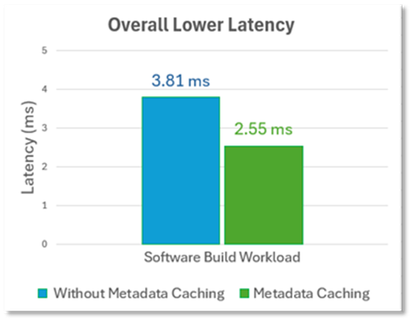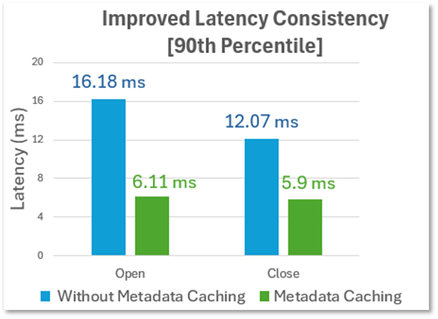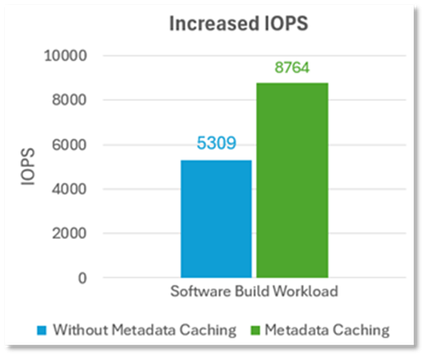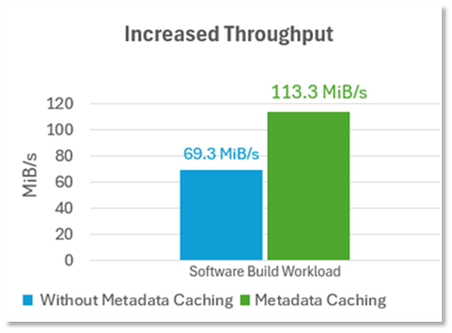Announcing the Public Preview of Metadata Caching for Azure Premium SMB File Shares

Azure Files is excited to announce the public preview of Metadata Caching for the premium SMB file share tier. Metadata Caching is an enhancement aimed at reducing metadata latency for file workloads running on Windows/Linux clients. In addition to lowering metadata latency, workloads will observe a consistent latency experience which will allow metadata intensive workloads to be more predictable and deterministic. Reduced metadata latency also translates to more data IOPS (reads/writes) and throughput.
Once Metadata Caching is enabled, there is no additional cost or operational management overhead when using this feature.
The following Metadata APIs will benefit from Metadata Caching.
- Create: Creating a new file; Up to 30% Faster
- Open: Opening a file; Up to 55% Faster
- Close: Closing a file; Up to 45% Faster
- Delete: Deleting a file; Up to 25% Faster
Workloads that perform a high volume of metadata operations (creating/opening/closing/deleting) against a SMB Premium File share will receive the biggest benefit compared to workloads that are primarily data IO (e.g. databases)
Example of metadata heavy workloads include:
- Web\App Services: Frequently accessed files for CMS\LMS services such as Moodle\WordPress.
- Indexing\Batch Jobs: Large scale processing using Azure Kubernetes or Azure Batch.
- Virtual Desktop Infrastructure: Azure Virtual Desktop\Citrix users with home directories or VDI applications with general purpose file system needs.
- Business Application: Custom line of business or legacy application with “Lift and shift” needs.
- CI\CD - DevOps Pipeline: Building, testing, and deployment workloads such as Jenkins open-source automation.
Expected Performance Improvement with Metadata Cache.
- 2-3x Improved Metadata Latency Consistency
- Improved Metadata Latency beyond 30%
- Increased IOPS and Bandwidth up to 60%
 |
 |

|
 |
How to get started
To begin onboarding to the Public Preview, please sign up on https://aka.ms/PremiumFilesMetadataCachingPreview and additional details will be provided.
Regions Supported
- Australia East
- Brazil Southeast
- France South
- Germany West Central
- Switzerland North
- UAE North
- UAE Central
- US West Central
(Updates will be provided as additional regions are supported and please sign up above to help influence the region prioritization)
Who should Participate?
Whether it is a new workload looking to leverage file shares or existing ones looking for improvements. Any workloads/usage patterns that contains metadata should be encouraged to onboard, specifically metadata heavy workloads that consist primarily of Create/Open/Close or Delete requests.
To determine if your workload contains metadata, can use Azure Monitor to split the transactions by API dimension as described in the following article
Thanks
Azure Files Team
Published on:
Learn moreRelated posts
Recovering dropped tables in Azure Databricks with UNDROP TABLE
Oops, Dropped the Wrong Table? What now? We’ve all been there: you’re cleaning up some old stuff in Databricks, run a quick DROP TABLE… and su...
Azure Developer CLI (azd) – February 2026: JMESPath Queries & Deployment Slots
This post announces the February 2026 release of the Azure Developer CLI (`azd`). The post Azure Developer CLI (azd) – February 2026: JM...
Improved Python (PyPi/uvx) support in Azure MCP Server
Azure MCP Server now offers first-class Python support via PyPI and uvx, making it easier than ever for Python developers to integrate Azure i...
Microsoft Purview: Data Lifecycle Management- Azure PST Import
Azure PST Import is a migration method that enables PST files stored in Azure Blob Storage to be imported directly into Exchange Online mailbo...
How Snowflake scales with Azure IaaS
Microsoft Rewards: Retirement of Azure AD Account Linking
Microsoft is retiring the Azure AD Account Linking feature for Microsoft Rewards by March 19, 2026. Users can no longer link work accounts to ...
Azure Function to scrape Yahoo data and store it in SharePoint
A couple of weeks ago, I learned about an AI Agent from this Microsoft DevBlogs, which mainly talks about building an AI Agent on top of Copil...